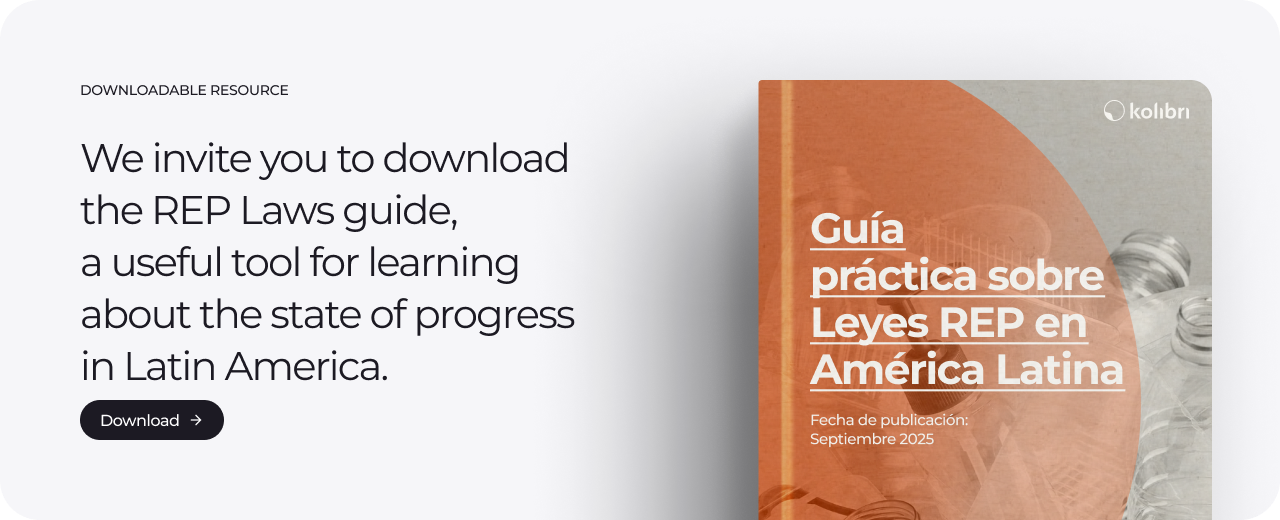Do you consider yourself an entrepreneur and do you like to work as a team in dynamic environments?
Access our job opportunities portal to find out about open searches or add your CV to our database.


5
min Lectura
August 27, 2025
Extended Producer Responsibility (REP) is gaining strength as a key instrument in the transition to circular economy models. Its logic proposes a key change: moving from a responsibility focused solely on production, to a more comprehensive view that also considers what happens with products and their packaging once the consumer discards them.
In Latin America, this approach is gaining relevance as regulations, consumer expectations and global pressures for greater traceability and reduced environmental impact grow along the entire value chain. Faced with this scenario, companies are beginning to rethink their role and involvement in effective post-consumer waste management.
At Kolibri, we accompany this process with concrete solutions: we design and implement reverse logistics and post-consumer material recovery systems adapted to the local context, focusing on traceability, low management costs and scalability.
At Kolibri we identify recurring challenges in the implementation of REP schemes in the region.
The REP not only responds to an expanding regulatory framework, it also allows companies to reduce the impact of their operations, ensure a supply of secondary raw materials, generate reliable data and strengthen their value proposition, integrating circularity criteria throughout their supply chain.
Regulatory requirements aren't the only driver. There is also increasing pressure from more aware consumers, corporate sustainability goals and global value chains that demand traceability, transparency and auditable metrics. Acting voluntarily allows you to prepare for global trends in corporate responsibility.
A comprehensive approach adapted to the context
We design and implement reverse logistics strategies adapted to the reality of each company and territory. Our approach seeks to solve the structural challenges of the material recovery system with a practical and operational perspective.
Let's design a tailor-made strategy
In contexts where informality predominates in waste management and data is often dispersed, incomplete or unreliable, technology works as a critical enabler. Having traceable and verifiable information not only improves operational efficiency, but it also allows us to generate concrete evidence of the impact, a key condition for scaling solutions and channeling investment.
Using AI engines specifically designed for this industry, we ensure the comprehensive traceability of the flow of materials, from the first mile to their valuation. These tools document each stage with commercial, photographic and logistical support, allow us to build robust indicators to make decisions with better information, and improve the ability to predict costs, risks and bottlenecks.
Incorporating technology into these schemes also opens the door to professionalizing the work of basic recyclers, integrating them with performance criteria and enabling new economic incentive mechanisms, such as payments for results or traceability bonds. This improves the governance of REP systems, reduces dependence on informal intermediaries and facilitates new ways of financing and certifying the impact achieved.
We operate in three countries—Mexico, Paraguay and Argentina—with a territorial approach that involves more than 38 recovery actors in 21 different regions. We work with up to 8 types of materials, plastics (PET, HDPE, LDPE, PP), cardboard, glass, aluminum and Tetra Brick, strengthening local value chains and contributing to an effective and traceable circular economy in the region.
We support projects such as My Waste-Free Neighborhood (Paraguay), FORTAL (Argentina) and FOREAL (Mexico), who achieve recover more than 21,000 tons of post-consumer materials annually.

Access our job opportunities portal to find out about open searches or add your CV to our database.

